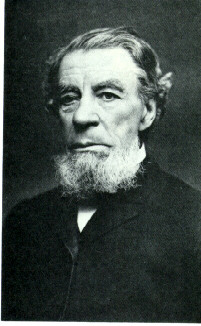 Nicholas de Romanis, fl 1209
Nicholas de Romanis, fl 1209 Martin van Buren, 1782-1862
Martin van Buren, 1782-1862 Gurdon Saltonstall Hubbard, 1802-1886
Gurdon Saltonstall Hubbard, 1802-1886 Teddy Roosevelt, 1858-1919
Teddy Roosevelt, 1858-1919 Clyde William Tombaugh, 1906-1997
Clyde William Tombaugh, 1906-1997In 1207, Pope Innocent III (1198-1216) placed the kingdom of England under an Interdict as the result of actions taken by King John (1199-1215) culminating in a debate over the appointment for a successor to the Archbishopric of Canterbury. The Interdict would stand until 1213 when John finally accepted Innocent's choice of Stephen Langton as Archbishop of Canterbury. Innocent's main negotiator throughout the Interdict was a Roman Cardinal and papal legate, Nicholas de Romanis.
During the time the Interdict was in effect, a scholar at Oxford was accused of raping a woman. When the burghers couldn't find the scholar, they hanged three of his friends in retaliation for his crime. The school at Oxford protested by abandoning the city and scattering to other schools throughout England, possibly setting up a facility in Cambridge.
On October 1, 1213, while Nicholas de Romanis was working to bring about the end of the Interdict, the citizens of Oxford sent him a letter asking him to resolve their problems with the scholars who had taught there. de Romanis agreed to help, visiting the city twice, in November 1213 and May 1214. On June 20, 1214, de Romanis's actions resulted in the issuance of a Charter for the University of Oxford.
The terms Nicholas de Romanis won for the scholars demonstrates how important the citizens of Oxford felt the school was to the fortunes of their city. Among other items, the citizens agreed to charge fixed rates for student housing and food, an annual payment to the school, the right of the school to judge anyone associated with the school and the creation of a Chancellorship for the University.Return to index
 Gurdon Saltonstall Hubbard1802-1886 |
Born on August 22, 1802 in Windsor, Vermont, the first time Gurdon Saltonstall Hubbard arrived in Chicago was on October 1, 1818. At the time, Hubbard wrote, the area was "Four and a half houses, a fort and a Potawatomi town." Beginning as a French voyageur, he would become a friend to the Indians, an adopted son of Chief Waba of the Kickapoo, husband to Watseka, niece of Chief Tamin of the Kankakees, Chicago's first insurance underwriter, the builder of Chicago's first stockyard, a financier and land speculator. The Indians called Hubbard "Pa-pa-ma-ta-be", which translates as "Swift-walker." He got this name after walking 75 miles in a single day to bring settlers in Danville back to Chicago to help fight off an Indian raid.. When a local Indian tribe questioned his ability to perform this feat, he challenged their champion walker to a race. Hubbard's challenger lost by several miles and was unable to move the next day. Hubbard seemed to be unaffected. The first winter Hubbard worked as a meatpacker was so cold, he was able to store the pig carcasses on the banks of the Chicago River without worrying about them spoiling. He later built the largest warehouse in the Midwest to house his meatpacking facilities. |
The Chicago Fire of 1871 nearly bankrupted him, however Hubbard eventually paid all the insurance claims his company was liable for.
Today, Gurdon Saltonstall Hubbard is virtually unknown in Chicago, his name mostly associated with "Hubbard's Cave", an area where the Kennedy Expressway passes under a series of streets, beginning with Hubbard Street. Writing in 1881, A.T. Andreas could state "only [Gurdon Saltonstall Hubbard] became identified with the modern commerce and trade of the city, who had been connected with the rude Indian traffic which centered in Chicago in the earlier times."Return to index
Once elected Vice-President, Roosevelt enrolled himself in law school, seeing the next four years as something of a waste of time. When McKinley died after Leon Czolgosz shot him because "it would be a good thing for the country to kill the President," Roosevelt was on a camping trip. McKinley's doctors had informed Roosevelt that the wounds wouldn't be fatal.
Although a Republican, Roosevelt fought for the common man, established the National Park system, was a staunch anti-monopolist and in favor of desegregation, inviting the first African-American as a guest to the White House (Booker T. Washington). In 1905, Roosevelt won the Nobel Peace Prize. He failed in many endeavors, such as removing "In God We Trust" from coinage (he saw it as sacriligious) and trying to simplify spelling.
The first man who succeeded to the Presidency on the President's death to be elected in his own right, Roosevelt made the public pledge not to run for re-election, later coming to fully regret that promise, although he lived up to it. After being turned out of office, he did try to win the office back from his chosen successor, William Howard Taft.Return to index
 |
 |